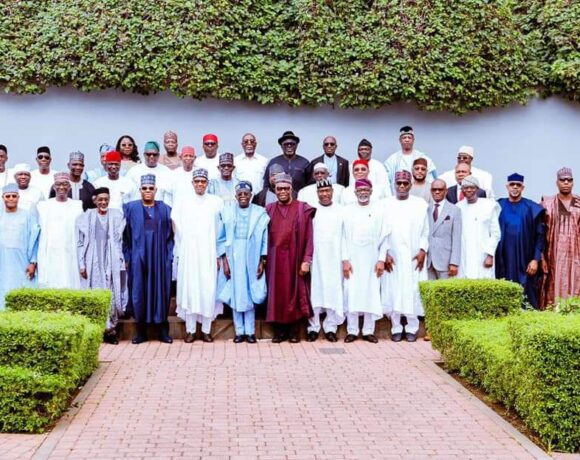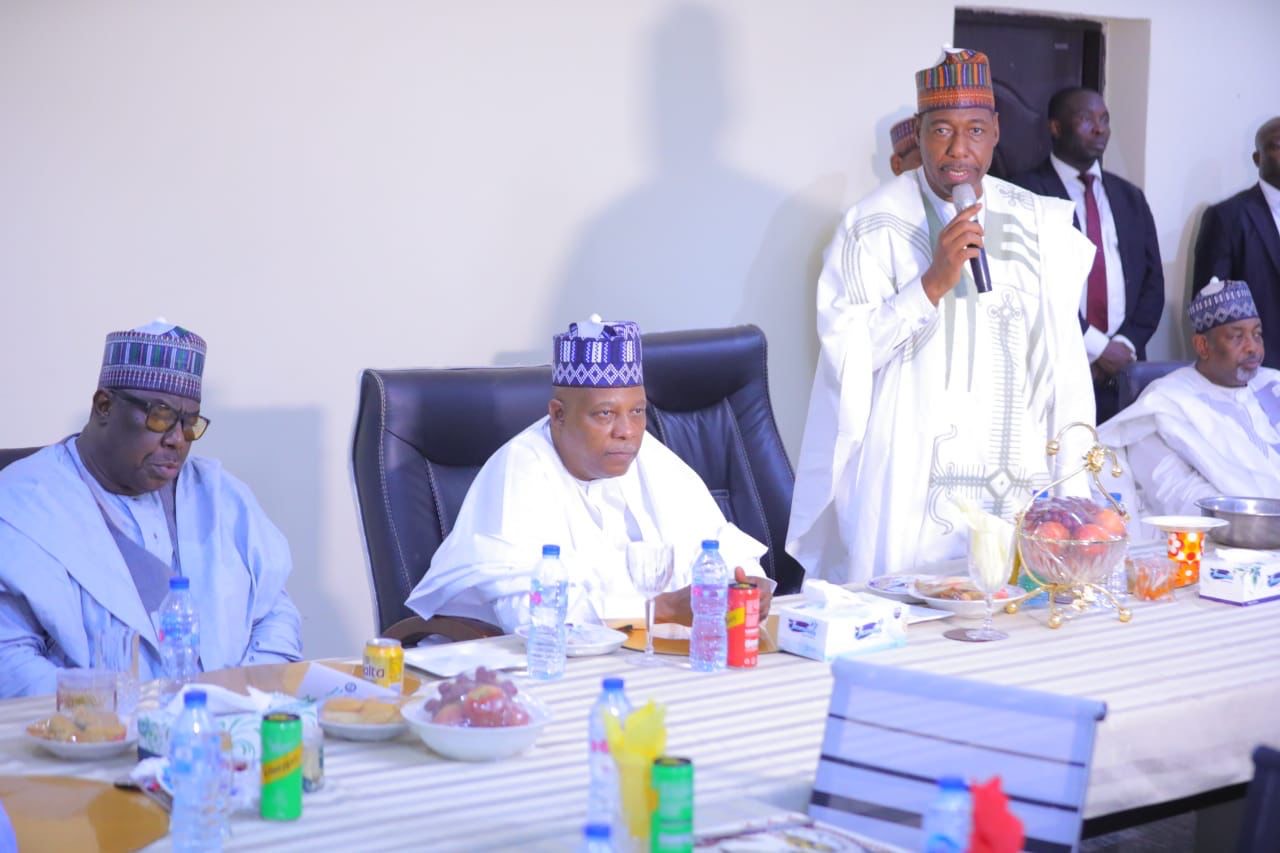Senate Presidency: Rooting For A Charismatic Fulani Senator Barau Jibrin

By Ibrahim Garba
With the presidential election long decided in favour of the All Progressives Congress Presidential Candidate, Asiwaju Bola Ahmed Tinubu, and his Vice Presidential Candidate, Senator Kashim Shettima, the party has naturally turned its focus on who would occupy the nation’s Number Three position, the person who would be Senate President and head of the Legislature.
The decision is crucial, seeing it will affect the relationship between the Executive and the Legislature. Although Nigeria’s Presidential Constitution recognises the check-and-balance role each of the three arms must play, players know that unbridled hostility, hot peace or cold war between the two political arms of government would be an ill wind that will do the nation more harm than good. With APC boasting the leading majority in the National Assembly, the onus lies on the ruling party to influence the emergence of an accommodating and diplomatic Number-Three Citizen to interface between the Legislature and the Executive.
Power must never be trusted without a check
Leading APC senators have thrown their hats into the ring for the top legislative job. None of these contenders is a pushover. The array of eminent aspirants includes: Former Abia State’s Governor Orji Uzor Kalu, incumbent President of the Senate, Ahmad Lawan, former House of Representatives Member and would-be third-term Senator Barau Jibrin from Kano State.
Others include former Minister of the Niger Delta Development Commission and former Akwa Ibom State’s Governor Godswill Akpabio, former APC National Chairman and former Edo State’s Governor Adams Oshiomhole, Zamfara State’s former Governor Abdul-Aziz Yari as well as Ebonyi State’s Governor Dave Umahi.
From this eminent class of 2023 Nigerian senators, 109 senators will pick their leader. Understandably, the contestants have all been criss-crossing the country, Abuja legislative quarters and Senate caucuses doing subtle campaigning among their colleagues.
EXECUTIVE AND LEGISLATURE, FRIENDS OR FOES
Although the Executive may pretend unconcerned neutrality to how senators decide the Senate leadership, it does have an influence. Little wonder that Ovie Omo-Agege made Aso Rock his first port of call within minutes of emerging as Deputy Senate President in 2019. That camaraderie underscored the relative harmony the NASS and the Executive enjoyed through Buhari’s second term, unlike the experience under the Bukola Saraki-led Eighth National Assembly.
Who wants to be monitored by a foe? In the US, also, Nancy Peloski (D) and Donald Trump (R) virtually fought to a standstill in their hostility towards each other. It was John Adams (US) who said, “…Power must never be trusted without a check.” Agreed, the Legislature must perform oversight on and check the Executive; but that assignment does not have to heat up the polity constantly.
AMIABLE SENATOR BARAU JIBRIN AND THE FULANI FACTOR
On the radar for the Senate presidency particularly is the amiable and erudite current Secretary of the Northern Senators Forum. Senator Barau Jibrin was born in 1959, a native of Kabo Town in the Kabo Local Government Area of Kano State. Those rooting for him see him as the best candidate for the post because he would bring into government the Fulani ethnic stock, already feeling alienated from the emerging administrative structure of the country.
He would also provide the socio-political balancing of the zones. Although the powerful North-West Fulani currently rules through President Muhammadu Buhari, that zone and the race are currently alienated from the scheme of things, with Tinubu’s emerging 2023 structure. Tinubu from the South-West will be President, with his Vice President Shettima hailing from the North-East.
While the President-Elect is from the major Yoruba tribe, Shettima is Kanuri, a minority stock native to mainly Borno and Yobe states.
The question is: What has the North-West brought to the Tinubu table to deserve a key role? Figures don’t lie. The North-West voted massively for the Tinubu-Shettima ticket. Having delivered 30 per cent of Tinubu’s total votes, the North-West has every justification to expect some appreciation and compensation. Tinubu beat Atiku in the North-West, scoring 2,652,824 votes compared to the PDP man’s 2,197,824. Not only were Atiku’s margins in some of the states narrow, Tinubu took a whopping half a million votes in Kano, where Jibrin hails from.
But Jibrin’s ascendancy to the Senate would go beyond fulfilling quota or Federal Character requirements. His peers recognise him as a quality and qualitative persona. In recognition of Barau’s sterling track record, the man has won several awards, including his biggest, the prestigious Nigerian national honour of Commander of the Order of the Niger (CON), conferred on him by President Muhammadu Buhari in October 2022.
Well read too, Jibrin holds a Bachelor’s Degree in Accounting, Master’s in Financial Management and Pricing, Master’s in Management and a Masters in Business Administration (MBA). He is also an alumnus of the prestigious Cornell University, United States. He worked briefly in the Accounting Department of the Kano State Foundation, before he resigned in 1992 to begin a flourishing private business spanning manufacturing, insurance and construction. His success in the private sector prepared him adequately to begin a process of championing the cause of his people through the instrumentality of politics.
FROM THE HOUSE TO THE SENATE –JIBRIN’S POLITICS
The Kano Legislator’s foray into active politics began when he contested and won election in 1999 as Honourable Member of the House of Representatives for Tarauni Federal Constituency of Kano State. He went on to serve as the Chairman of the House of Representatives’ Committee on Appropriations. Simultaneously, he sat on the House’s Committee on Power.
After that single term in the House of Representatives, Hon. Jibrin returned to his private business. He was later called upon to serve as Chairman of the Kano State Investment and Properties Ltd. Thereafter, he became Kano State Commissioner for Science. In 2001, President Olusegun Obasanjo appointed him to serve as member of a committee to review Nigeria’s Budgetary processes. In 2009, the Kano State Government appointed him into its Business Incentive Committee.
On his return to electoral contest in 2015, Jibrin aimed higher. He contested and won election to the Senate of the Federal Republic of Nigeria, representing the Kano-North Senatorial District under the platform of the APC. There he was appointed Vice Chairman of the Senate Committee on Petroleum Resources (Downstream). He subsequently became the Chairman of that committee. Later in 2016, he became Chairman of the Senate Committee on Tertiary Institutions and TETfund, as well as a member of the Committee on Niger Delta, Committee on Industries, Committee on Land Transportation and Committee on Appropriations. Jibrin was re-elected in 2019 and is currently the Chairman of the Senate Committee on Appropriations.
Having secured the APC ticket through a decisive primaries process (decided unanimously by the 697 party delegates at the primary), Jibrin was again re-elected to the Senate for the third time on 25th February 2023. He polled 234,652 votes to defeat his closest rival, the candidate of the New Nigeria People’s Party (NNPP), Abdullahi Baffa, who scored 177,014.
FAVOURED BY NATIONAL ASSEMBLY RULES AND POLITICS
The Senate’s Standing Orders favour Jibrin in terms of tenure and seniority. Order 3, Rule 2 of the Senate Standing Orders 2022, as amended, dealing with the nomination of presiding officers and appointments of principal officers and other officers of the Senate, directs that leaders should emerge in accordance with the ranking of senators. In determining ranking, the following order would usually apply:
(i) Senators returning based on number of times re-elected;
(ii) Senators who had been members of the House of Representatives,
(iii) Senators elected as Senators for the first time.
Jibrin will be sworn in for his third term at the proclamation of the 10th National Assembly in June 2023. As a former Honourable Member of the House of Representative (1999-2003, for Tarauni Federal Constituency of Kano State) and a returning third-termer in the Senate, Jibrin wields formidable and wide-ranging parliamentary experience. He towers shoulder high above most of those eyeing the seat.
KANO’S LAST MAN STANDING/NORTH-WEST AND KANO INFLUENCE
Before the February 25 elections, permutations signalled that Tinubu’s failure to pick a Fulani as Running Mate would hurt his electoral performance up North. This permutation proved significantly accurate: Atiku won four of the seven North-West states (Kaduna, Katsina, Kebbi and Sokoto). Tinubu’s APC picked two (Jigawa and Zamfara), while NNPP’s Rabiu Musa Kwankwaso took one, his home Kano State.
It is to Jibrin’s charismatic credit that the Rabiu Kwankwaso storm failed to floor this three-tenured Legislator. Not only did Kwankwaso’s NNPP win the Kano State governorship, the party pocketed two of the three Senate seats. Of Kano’s three APC Senate candidates, Jibrin remains the last man standing. Thus, as the only APC Senator from Kano State, Barau deserves to be considered for the Senate President seat. For one, this will shore up the dwindling influence of APC in Kano State. Kano alone contributed 500,000 votes to Tinubu. Kano supporters are asking whether that should be jettisoned to favour aspirants to the Senate who contributed fewer votes. The importance of Kano (which Senator Barau represents) in Nigerian politics cannot be easily discounted. It is the hotbed of Northern Nigerian politics.
For pundits, the Hausa-Fulani must be brought into the Federal equation under the Tinubu dispensation. The stars appear lined up for Kano APC’s last man standing, Senator Barau Jibrin, as the next Senate President. Apart from filling the Fulani quota, he is formidably, legislatively and academically qualified for the post.
*Ibrahim Garba writes from Abuja
The Insight Report
Nigeria Coverage



